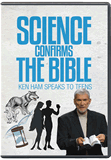Science of Uncertainty
“Science Is Not About Certainty” a noted theoretical physicist writes. For many people that might be a startling claim.
Rovelli makes clear that the essence of science is gathering data and interpreting that data in ways that are often insufficient, limited, and changeable.
Dr. Carlo Rovelli—one of the originators of “loop quantum gravity theory”—recently published an article discussing the nature of science. The piece, called “Science Is Not About Certainty,” makes some points that biblical creationists have been pointing out for a long time.
Physicist Rovelli is an evolutionist and does not in the piece explore his personal religious beliefs (though he does disparage religious claims regarding certainty and truth), but he makes some refreshingly honest points about science. For one thing, Rovelli makes clear that the essence of science is gathering data and interpreting that data in ways that are often insufficient, limited, and changeable:
We have observations, we have data, data require organizing into theories. So then we have theories. These theories are suggested or produced from the data somehow, then checked in terms of the data. Then time passes, we have more data, theories evolve, we throw away a theory, and we find another theory that’s better, a better understanding of the data, and so on and so forth.
The data scientists observe must be interpreted, and Rovelli makes clear that a scientist’s philosophy will affect the interpretation. “Since theories change, the empirical content is the solid part of what science is,” he says. After bombastic statements by so many evolutionists—such as Bill Nye in the Nye-Ham Debate or representatives of the National Center for Science Education, who declare that students should never be taught that “theories” like molecules-to-man evolution and the big bang are at all controversial—the admission that scientific interpretations of data are fallible, changeable, and influenced by philosophical understanding is refreshing.
“The deepest misunderstanding about science,” Dr. Rovelli writes, “is the idea that science is about certainty. Science is not about certainty. Science is about finding the most reliable way of thinking at the present level of knowledge. Science is extremely reliable; it’s not certain.” He then makes a statement that runs contrary to the declarations of many evolutionary drumbeaters and media pundits:
The very expression “scientifically proven” is a contradiction in terms. There’s nothing that is scientifically proven. The core of science is the deep awareness that we have wrong ideas, we have prejudices. We have ingrained prejudices.
Dr. Rovelli indicates that a scientist’s preconceived notions—prejudices about the nature of reality—typically not only influence but even limit his interpretation of data, even causing him to overlook important scientific truths, including undiscovered major scientific principles.
When it comes to understanding the nature of the unobservable past, the presuppositions or prejudices of scientists affect how they interpret data relevant to our origins. If a scientist presupposes that nothing supernatural exists and is willing to accept only naturalistic explanations for our origins, then that scientist ignores an important part of reality—the Creator God—who created all that exists, including the laws of nature—those laws of science that make experimental science logical, repeatable, and predictable in the first place.
Evolutionary scientists, for instance, try to come up with naturalistic explanations for the existence of diverse, complex forms of life and for life itself even though biological science does not provide observational evidence to support either abiogenesis or molecules-to-man evolution. By ignoring the role of our Creator in the origin of life and all things, they are ignoring the reality that makes origins make sense.
The Importance of Seeing the Big Picture
Dr. Rovelli also writes about the importance of being willing to change one’s prejudices and how so doing can enable a scientist to see the big picture. Scientists who thought “outside the box” like this included Einstein and Newton. Rovelli indicates that their philosophy—their willingness to think outside the normal understanding of the world—enabled them to discern hitherto unthought-of scientific truths. Author of a book about Greek philosopher Anaximander—perhaps the first scientist on record to describe correctly the earth as a sphere in space—Dr. Rovelli points out that Anaximander had to change the way he thought about the physical world in order to correctly understand it.
When Dr. Rovelli tries to explain the apparent conflict between “science” and “religion,” he unfortunately forgets that evolutionary scientists are sadly not in the habit of admitting that “scientific thinking is a constant reminder to us that we don’t know the answers” (emphasis Rovelli’s). How often do we hear evolutionists declare that they know molecules-to-man evolution (and abiogenesis, and the big bang, and millions of years, and so forth) to be true? That only the details of how these processes played out in the past remain to be discovered? Rovelli points out that “religion” claims to “know” whereas science admits that it doesn’t know. By that criterion, evolutionary science is much more religion than science.
For all his refreshing insight about the uncertainty of scientific theories and interpretations, Dr. Rovelli seems to misunderstand the nature of the certainty available in religion, or rather in biblical Christianity. The Bible is the revelation of our Creator God to mankind. The eternal God of the Bible, our Creator, was the eyewitness to all of history. Nothing that He has told us in His Word contradicts the information, the data, gathered by experimental science. In fact, it was faith that our Creator was wise, logical, and consistent that motivated many Bible-believing scientists like Isaac Newton to search for the laws of science, or the laws of nature, that God created to govern the universe He had made.
The Bible Is Not a Science Textbook, But It Is True and Reliable
That is not to say, however, that biblical Christianity claims to supply all scientific knowledge; such a claim would be silly. The Bible is not a science textbook, and there is a vast amount of scientific knowledge to be gained about ourselves, our world, and our universe. In fact, the scientific method is effective because God created an orderly universe that functions in accord with the scientific laws He put in place. Science works because God created! A biblical understanding of Creation can even help scientists make predictions and avoid erroneous thinking, such as the mistaken notion that some organs are useless vestigial remnants of our supposed evolutionary past.
The history in the Bible—information concerning the Creation, the global Flood, and the age of the earth, for instance—is a reliable yardstick by which to evaluate many scientific theories and eliminate those that clearly violate God’s account of our past. Worldview does affect how scientists interpret what they observe, and Dr. Rovelli seems to recognize that, at least within limits.
“To sum up, science is not about data; it’s not about the empirical content,” Dr. Rovelli writes. He encourages scientists to embrace philosophy, to allow their “vision of the world” to expand. To acknowledge that “they [as scientists] have a head full of ideas about what philosophy they’re using” whether they realize it or not. He adds, “They’re taking a position without knowing that there are many other possibilities around that might work much better and might be more interesting for them.”
God . . . has left us an eyewitness account of our origins and the early history of the earth in Genesis, a history that is consistent with the observable facts of science.
The only true account of our origins is that provided by God in the Bible. Therefore, the only worldview that can reliably guide scientists to conclusions about our origin and nature that are actually true is one that does not violate biblical history—the yardstick by which to assess ideas relevant to the unobservable past. If only all scientists wishing to explain our origins would allow their vision to include an understanding that the physical universe was brought into being by a Creator God, a God who has left us an eyewitness account of our origins and the early history of the earth in Genesis, a history that is consistent with the observable facts of science.
Recommended Resources

Answers in Genesis is an apologetics ministry, dedicated to helping Christians defend their faith and proclaim the good news of Jesus Christ.
- Customer Service 800.778.3390
- © 2024 Answers in Genesis








